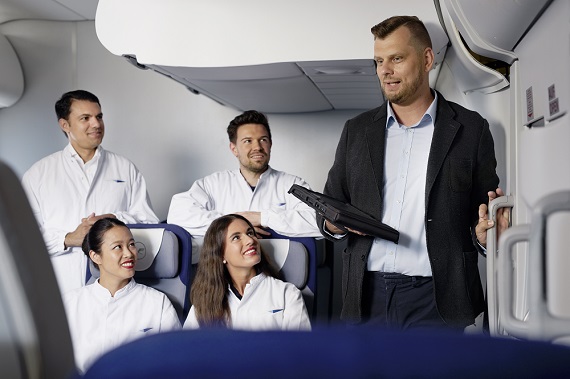
Resources
Home
/
Resources

Comprehensive BBA Aviation Curriculum
Explore the key subjects and skills offered in a BBA Aviation program for aspiring professionals.
A Bachelor of Business Administration (BBA) in Aviation covers vital subjects like aviation management, airport operations, air traffic control fundamentals, and airline marketing. This curriculum prepares students with knowledge of aviation regulations, safety protocols, and business principles. Courses include flight safety, aviation law, and cargo management. The program focuses on developing management skills specific to the aviation industry, ensuring graduates can efficiently handle operational challenges, customer service, and administrative roles in airlines or airports. Practical exposure through case studies and industry visits enhances readiness for real-world scenarios.
Effective Cabin Crew Training Essentials
Discover vital training components that prepare cabin crew for professional airline roles.
Cabin crew training encompasses safety procedures, first aid, emergency evacuation, and in-flight service etiquette. Trainees learn to handle diverse passenger needs, communicate clearly, and maintain composure during emergencies. Training also covers grooming standards and cultural sensitivity to ensure professional appearance and effective passenger interaction. The program integrates practical drills such as simulated cabin situations to enhance decision-making under pressure. Additionally, awareness of aviation security protocols and customer care ensures that cabin crew provide a comfortable and safe travel experience.
Ground Staff Roles and Training Insights
Understand the multifaceted training ground staff receive for airport operations.
Ground staff training prepares individuals for managing passenger services, check-in procedures, baggage handling, and coordination with security officials. It includes instruction on the use of airport management software, compliance with international aviation standards, and effective communication skills. Trainees also gain knowledge about flight scheduling, boarding pass verification, and assisting passengers with special needs. The curriculum incorporates safety awareness and conflict resolution strategies vital for smooth airport functioning.
Advancements in Airport Security Training
Learn the essential skills taught for maintaining safety and security in airports.
Airport security training focuses on threat detection, surveillance techniques, baggage screening, and adherence to regulatory standards. Personnel are trained to use security technology like X-ray machines and metal detectors efficiently. Courses include protocols for handling suspicious items, maintaining passenger safety, and emergency response management. Training also covers legal frameworks governing airport security, cultural sensitivity, and crisis communication to handle various security challenges effectively.
Frequently Asked Questions
What qualifications are needed to join the BBA Aviation program?
Candidates generally require completion of higher secondary education with good marks, preferably in commerce or science streams, to enroll in BBA Aviation programs.
How long is the cabin crew training course?
Cabin crew training typically lasts 3 to 6 months, combining theoretical lessons and practical simulations to prepare trainees for airline employment.
Are ground staff training courses recognized by aviation authorities?
Yes, accredited ground staff courses comply with aviation regulatory bodies to ensure standards are met for airport operations.
What skills does airport security training emphasize?
The training focuses on threat identification, use of scanning equipment, emergency procedures, and adherence to security protocols.
Does the academy provide assistance in job placements?
Many aviation institutes offer placement support by connecting trained students with airlines and airport employers, though specifics vary by academy.
Is personality development important in aviation careers?
Personality development enhances communication, confidence, and professionalism, which are critical for customer-facing aviation roles.
Can foreign students enroll in these aviation courses in India?
Yes, foreign students can typically enroll subject to visa requirements and fulfillment of academic prerequisites.
Are language skills part of aviation training programs?
Yes, spoken English and communication skills form an essential component to ensure clear interaction in global aviation contexts.
What is the typical career path after completing aviation operations training?
Graduates can pursue roles like flight operations officer, airline coordinator, or airport management executive depending on specialization.
How practical is the training provided by aviation academies?
Comprehensive aviation training combines classroom learning with hands-on simulations and internships for effective skill development.
Join The Academy
Fill the form to kickstart your aviation career with our expert training and mentorship programs.
